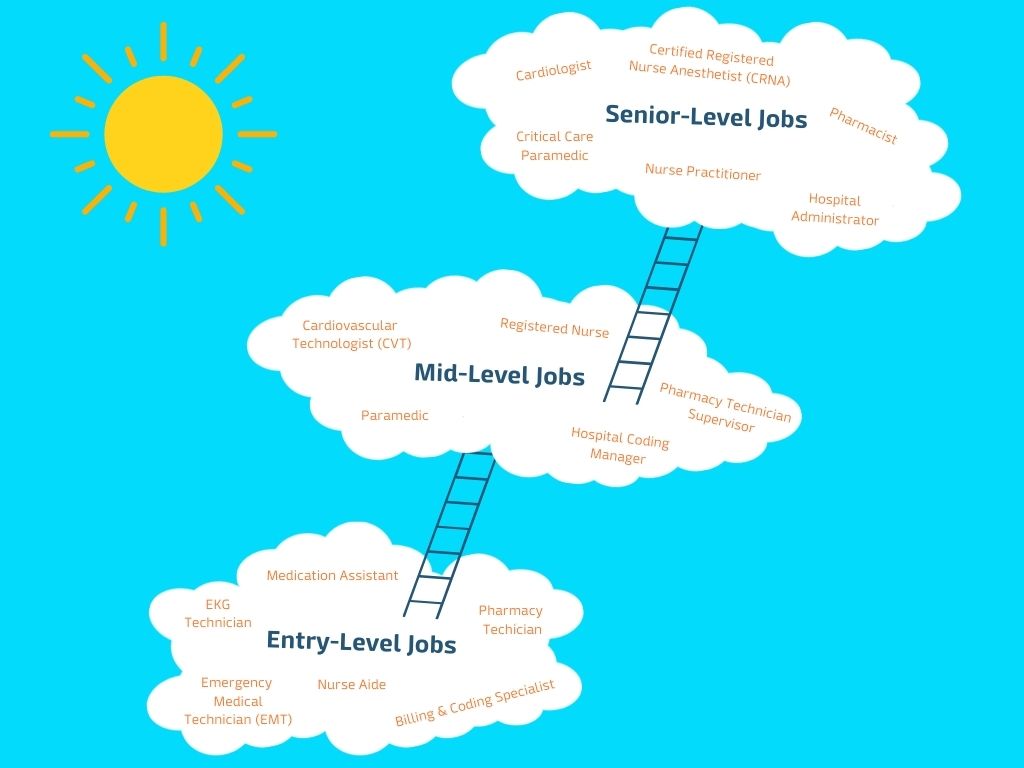
Did you know that six of the top ten fastest-growing jobs in the U.S. are in healthcare? In fact, the majority of the highest-paying occupations are in that field. If you’re looking for an in-demand and well-paying career, Virginia’s FastForward program is the quickest way to start climbing the healthcare ladder.
FastForward offers 6 to 12-week workforce training programs for Emergency Medical Technicians (EMTs), EKG technicians, pharmacy technicians, billing and coding specialists, nurse aids and medication assistants. While these jobs are considered entry-level, they are all foundational to anyone who wants to advance in the healthcare field. Every nurse practitioner or pharmacist has to start somewhere.
Emergency Medical Technician (EMT)
Emergency Medical Technicians, or EMTs, respond to emergency calls, perform medical services and transport patients to medical facilities. While the job can be stressful, it is incredibly rewarding to save lives. According to the U.S. Bureau of Labor Statistics, the median annual wage for EMTs is $36,930, but that salary improves as one advances in the field.
The next step in the EMT career path is to become a paramedic. While both jobs are similar, paramedics required more specialized training, as the procedures they perform are often more complex than those performed by EMTs, such as inserting IV lines, administering drugs, and applying pacemakers. Fortunately, Virginia’s G3 program offers paramedic training, often at no cost to students. Paramedics take home a median salary of $46,874, but with a little extra effort, they can earn even more.
EKG Technician
EKG technicians conduct various tests of a patient’s heart and lungs, primarily through electrocardiograms (EKGs). EKG machines monitor the heart’s performance through wires and electrodes attached to a patient’s chest, arms and legs. According to ZipRecruiter, EKG technicians make an average of $41,388 per year, but if they’re able to advance to a mid-level position, a cardiovascular technologist (CVT), their earning potential spikes: CVTs earn a median annual salary of $60,570.
Day-to-day, CVTs work alongside cardiologists and physicians to diagnose and treat heart-related diseases or ailments. They also work in laboratories to conduct tests on patients’ pulmonary or cardiovascular systems and assist with EKGs, heart catheterizations and similar invasive tests. In order to become a CVT, you must complete a degree program, which typically takes two years, but it’s well worth the time.

Pharmacy Technician
Pharmacy technicians assist pharmacists with filling and distributing prescriptions, respond to requests from patients and healthcare providers, help maintain records, and perform customer service and administrative duties. According to ZipRecruiter, pharmacy techs make an average salary of $32,416, which is well above minimum wage, which in Virginia, is around $21,120 per year.
If you’re looking to make a bit more money than that, with enough experience, you can advance to the mid-level position on this track: a pharmacy technician supervisor. Pharmacy technician supervisors have some of the same responsibilities as pharmacy techs, but they also have a more managerial role. They help the pharmacy to hire new pharmacy techs, write employees’ schedules, and oversee the daily workflow of the pharmacy. With the additional responsibilities, pharmacy tech supervisors earn a median salary of $46,948.
Billing and Coding Specialist
If you’re interested in the healthcare field, but are a little squeamish, a billing and coding specialist job may be perfect for you. Billing and coding specialists help a healthcare facility, such as a doctor’s office or hospital, manage insurance claims, invoices, and payments. While the billing aspect is pretty self-explanatory, medical coding involves taking a provider’s diagnostic and procedural notes and converting them into the correct codes for record-tracking and billing purposes. Billing and coding specialists take home an average salary of $37,186 and they don’t even have to get their hands dirty.
When you’re ready for more responsibility, the next step on this career path is as a hospital coding manager. Coding managers oversee junior medical coding staff members and the additional education and responsibility, though, earns coding managers a median salary of $69,219.
Nurse Aide
Nursing is a popular career, especially since the demand for nurses has increased with COVID, and many nurses begin their careers as a nurse aide. A nurse aide, or a certified nursing assistant (CNA) provides healthcare and support to patients in a medical facility. Their main duties include offering basic physical assistance to patients, feeding patients according to their dietary needs and recording vital signs. Nurse aids make a median salary of $28,540, but this can range depending on where you live.
For many nurses, becoming a CNA is a stepping stone to becoming a registered nurse. A registered nurse (RN) assesses and identifies patients’ needs, then implements and monitors the patient’s medical plan and treatment. They also coordinate for the patient’s care alongside doctors. A registered nurse makes a median salary of $75,330, which is a big improvement from working as a CNA. A potential RN needs an associates’ or bachelor’s degree, depending on the employer’s requirements, and additionally, hopeful RNs must also pass the National Council Licensure Examination for Registered Nurses (NCLEX-RN). If a registered nurse wants to progress even further in the field, they can become a nurse practitioner.
If you’re interested in pursuing any of these career paths, we’re here to help! To learn more about the FastForward programs available near you as well as financial assistance programs and incentives, contact us today and we’ll put you in touch with your local career coach.